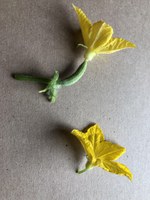Dakota Gardener: The Importance of Bees in Vegetable Gardens and Backyard Orchards
(Click an image below to view a high-resolution image that can be downloaded)
By Esther McGinnis, NDSU Extension Horticulturist
June 22-28 is National Pollinator Week.
Why do we celebrate bees and other pollinators? Ever hear the expression “busy as a bee”? One out of four bites of human food is courtesy of hard working bees.
While bees do not pollinate cereal crops such as wheat and barley, they are responsible for pollinating the majority of our vegetable, fruit and nut crops grown in the U.S. If bees disappeared from the Earth, we wouldn’t starve. However, our diets would be a whole lot less colorful and nutritious.
Why are bees so important for vegetable, fruit and nut production? Try not to blush: I am going to discuss plant reproduction.
Take cucumbers as an example. If you look closely in the garden, you will notice two types of flowers on the vines. The female flowers have a small ovary beneath the petals that resembles a tiny cucumber. In addition to the ovary, the female flower has a structure called a stigma to receive pollen grains from the male flower.
The male flower lacks an ovary and bears pollen-producing structures called anthers. If you have separate, immobile male and female flowers on the vine, how does pollination happen? That’s where bees come into play. As they visit flowers on the cucumber vine, they accidentally pick up pollen grains from the male flower and bring them to the female flower. If bees are scarce in your area, you may have fewer cucumbers setting fruit.
Bees are absolutely essential for the production of apples. Unlike cucumbers, apples do not have separate male and female flowers.
However, to produce apples, you need bees carrying pollen between two separate apple trees that are different cultivars. For example, a ‘Honeycrisp’ apple blossom will not set fruit if a bee deposits pollen from a second ‘Honeycrisp’ apple tree. However, if pollen from a second cultivar such as ‘Haralson’ is deposited, a fruit may develop.
As you can see, bees are necessary to carry pollen between flowers and even between entire trees. Bees are an elegant solution to the problem of plants that cannot move.
To celebrate National Pollinator Week, consider incorporating native and ornamental flowering plants in your landscape to provide food for honey bees and native bees. Bees need flower nectar (a source of carbohydrates) and pollen to nourish their young and for a balanced diet. You can plant flowers and nourish your pollinators.
To learn more, download the NDSU Extension Publication titled “Pollination in Vegetable Gardens and Backyard Fruits” at https://tinyurl.com/FruitPollination-NDSU.
For more information, contact your local NDSU Extension agent. Find the Extension office for your county at https://www.ag.ndsu.edu/extension/directory/counties.
NDSU Agriculture Communication - June 23, 2020
| Source: | Esther McGinnis, 701-231-7971, esther.mcginnis@ndsu.edu |
|---|---|
| Editor: | Ellen Crawford, 701-231-5391, ellen.crawford@ndsu.edu |




